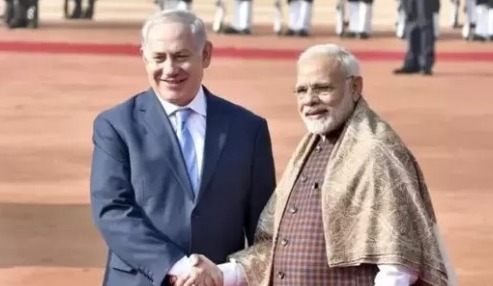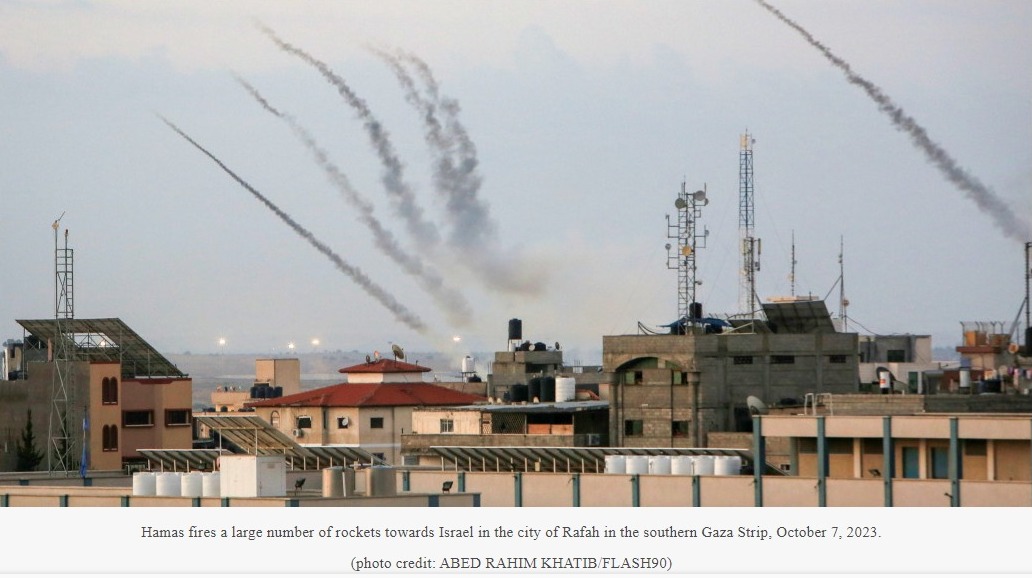Prime Minister Narendra Modi expressed profound dismay over the Hamas attack on Israel, which claimed the lives of at least 22 people. Offering his condolences and prayers, PM Modi affirmed Bharat’s unwavering solidarity with Israel during this challenging period. In a tweet posted hours after rockets launched by the Hamas group instigated a conflict in Israel, PM Modi stated, “I am deeply shocked by the news of the terrorist attacks in Israel. Our thoughts and prayers are with the innocent victims and their families. We stand firmly in solidarity with Israel during this difficult hour.”

Israeli Prime Minister Benjamin Netanyahu, during his televised address, announced a comprehensive mobilization of the army, signaling the commencement of what he described as not just an operation or a round, but a full-scale war. He declared, “The enemy will face an unprecedented cost,” vowing that Israel would respond with a level of force that the enemy had never before experienced.
The Israel-Hamas Conflict: A Struggle for Security and Sovereignty
The Israel-Hamas conflict, a longstanding and deeply complex issue, has once again taken center stage, sparking heated debates and discussions worldwide. While every human life lost in this conflict is tragic, it’s essential to consider the complexities of the situation and understand the context from the Israeli perspective. In this article, we will explore the Israeli viewpoint regarding the recent Israel-Hamas conflict, shedding light on the challenges faced by Israel in its pursuit of security and peace.
Historical Context
To understand the Israeli perspective, one must consider the historical context of the conflict. Israel emerged as an independent state in 1948, following centuries of Jewish persecution and the horrors of the Holocaust. The nation was founded with the aim of providing a homeland for the Jewish people, offering security and sanctuary in the wake of unprecedented atrocities.
Security Concerns
Israel has faced consistent security threats since its inception. The nation is surrounded by countries and entities openly hostile to its existence. Hamas, an internationally recognized terrorist organization, has consistently launched rocket attacks from Gaza into Israeli civilian areas. These attacks, which intensified in recent years, have terrorized Israeli citizens, causing psychological trauma and significant economic damage.
Humanitarian Challenges
In addition to security concerns, Israel faces significant humanitarian challenges in dealing with the Gaza Strip, controlled by Hamas since 2007. Despite Israel’s efforts to provide humanitarian aid, Hamas diverts resources intended for civilian use to fund its militant activities, leaving the people of Gaza in dire conditions. Israel’s blockade, implemented to prevent the smuggling of weapons into Gaza, is a response to legitimate security concerns rather than an attempt to cause suffering.
Israel’s Right to Self-Defense
Like any sovereign nation, Israel has the right to defend its citizens from external threats. The rocket attacks launched by Hamas, often indiscriminately targeting civilian areas, leave Israel with no choice but to respond militarily. The Israel Defense Forces (IDF) undertake extensive efforts to minimize civilian casualties, including warning residents before airstrikes. Unfortunately, Hamas’s tactic of embedding its military infrastructure within civilian areas makes it challenging to avoid civilian casualties entirely.
Peaceful Coexistence Efforts
Israel remains committed to a peaceful resolution of the conflict. The nation has engaged in numerous peace negotiations over the years, demonstrating its willingness to compromise and work towards a two-state solution. However, achieving peace requires a partner committed to peaceful coexistence. Hamas’s refusal to recognize Israel’s right to exist and its continued aggression undermine the prospects for meaningful dialogue.
International Support for Israel’s Security
Israel’s actions in the recent conflict have garnered support from several nations including Bharat, and international bodies. Many countries recognize Israel’s right to defend itself against terrorism and aggression. The international community acknowledges Israel’s efforts to balance its security needs with humanitarian concerns, recognizing the challenging situation the nation faces.
The Israel-Hamas conflict is a deeply entrenched and multifaceted issue. While the human cost of the conflict is undeniably tragic, understanding the Israeli perspective is essential for a comprehensive analysis. Israel’s pursuit of security, sovereignty, and peaceful coexistence is at the heart of its actions. As the international community seeks a resolution, acknowledging Israel’s legitimate concerns is crucial for fostering genuine dialogue and building a path towards a lasting peace in the region.
[Images for the internet]




